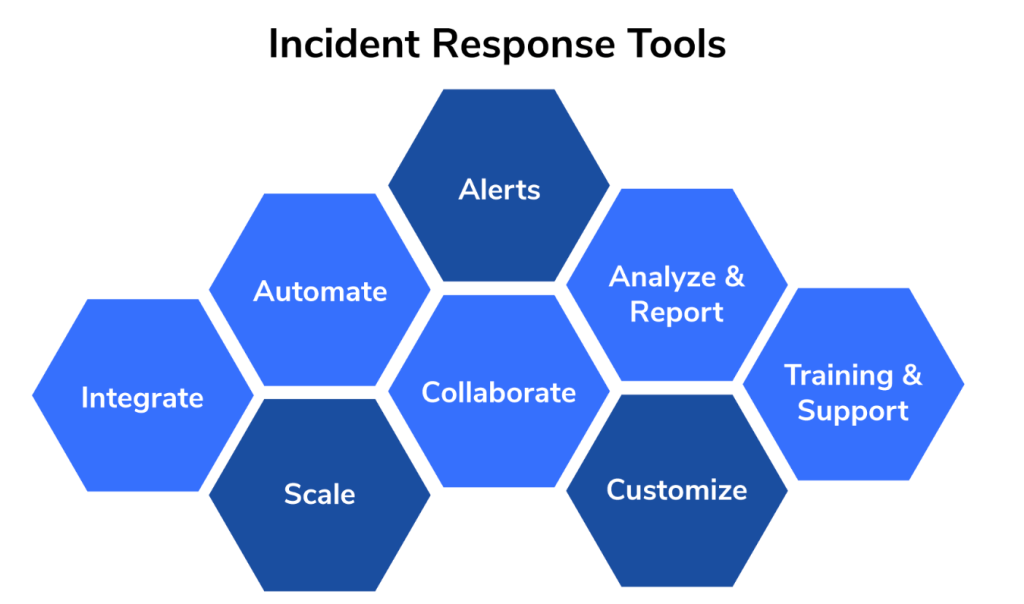
The need for seamless incident response and collaboration has never been greater. In 2024, the landscape offers a range of exciting tools bridging the gap between reactive responses and proactive collaboration. Here’s a look at some key players:
Unified Incident Response Platforms:
- Squadcast: Designed for modern DevOps teams, featuring situation rooms, automated playbooks, and real-time communication channels.
- Incident.io: Simple and user-friendly, ideal for smaller teams, emphasizing collaboration and rapid resolution.
- FireHydrant: Focuses on incident response automation and collaboration, with runbooks, checklists, and incident communication channels.
- Rootly: AI-powered platform prioritizing root cause analysis and proactive issue prevention.
Collaboration and Communication Tools:
- Slack: Popular team communication platform facilitating incident discussions, document sharing, and action item tracking.
- Google Docs/Sheets: Collaborative editing tools for creating and revising post-mortem reports and action plans.
- Zoom/Microsoft Teams: Video conferencing platforms enabling live discussions and knowledge sharing during incident response.
Monitoring and Logging Tools:
- Datadog: Comprehensive platform providing historical incident data and analysis through dashboards and alerting.
- New Relic: Offers root cause analysis tools and detailed incident timelines for in-depth investigations.
- ELK Stack: Powerful log management solution allowing slicing and dicing data for analyzing incident sequences.
Other Notable Tools:
- PagerDuty: Focuses on incident alerting and escalation, notifying the right people quickly and efficiently.
- XMatters: Emphasizes service reliability and proactive incident prevention.
- Sprinto: Incident management solution geared towards cloud environments and compliance automation.
Choosing the Right Tools:
Selecting the best tools depends on your specific needs and environment:
- Team size and structure: Do you need a solution for a small team or a large enterprise?
- Complexity of IT environment: On-premises, cloud, or hybrid?
- Incident volume and types: How many incidents do you handle, and what types are most common?
- Budget: Open-source, freemium, or paid subscription?
- Integration needs: Compatibility with existing tools and workflows.
Best Practices for Effective Incident Response and Collaboration:
- Define clear roles and responsibilities: Ensure everyone knows their part in the process.
- Prioritize effectively: Focus on critical incidents first to minimize impact.
- Automate routine tasks: Use automation to free up time for human intervention.
- Communicate effectively: Keep stakeholders informed throughout the incident.
- Conduct post-mortems: Learn from each incident to prevent future occurrences.
- Foster a culture of collaboration: Encourage open communication and information sharing.

👤 About the Author
Rahul is passionate about DevOps, DevSecOps, SRE, MLOps, and AiOps. Driven by a love for innovation and continuous improvement, Rahul enjoys helping engineers and organizations embrace automation, reliability, and intelligent IT operations. Connect with Rahul and stay up-to-date with the latest in tech!
🌐 Connect with Rahul
-
Website: MotoShare.in
-
Facebook: facebook.com/DevOpsSchool
-
X (Twitter): x.com/DevOpsSchools
-
LinkedIn: linkedin.com/company/devopsschool
-
YouTube: youtube.com/@TheDevOpsSchool
-
Instagram: instagram.com/devopsschool
-
Quora: devopsschool.quora.com
-
Email: contact@devopsschool.com

